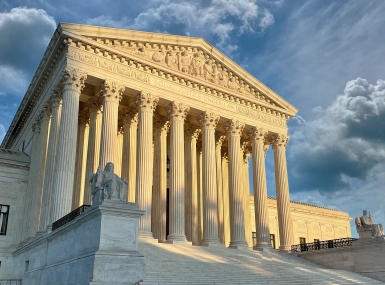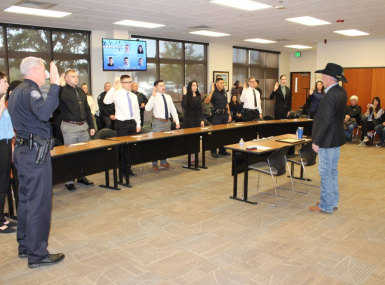U.S. Supreme Court ruling may increase counties' legal liability when transferring employees
Author
Upcoming Events
Related News

Key Takeaways
On April 17, the U.S. Supreme Court issued a 6-3 ruling in Muldrow v. St. Louis, a case focused on the standard under which an employer is liable for civil rights damages over an unwanted employment transfer. In the case, an employee alleged that her lateral transfer within the St. Louis Police Department was motivated by gender bias and constituted discrimination under Title VII of the Civil Rights Act regardless of whether she could demonstrate significant or material harm resulting from the move.
- County nexus: In a season of acute workforce shortages, the ability to make lateral transfers without fear of legal action is an important tool for county governments to ensure we have appropriate staffing to meet our various responsibilities for safeguarding the safety, health and wellbeing of our residents. A ruling allowing all lateral transfers, regardless of associated material harm, to qualify as actionable adverse employment actions could profoundly impede the ability of local governments to assign police, fire, and EMS personnel where they are most needed.
- NACo advocacy: Through the Local Government Legal Center, NACo filed an amicus brief in support of the respondent arguing that adopting the rule advocated by the petitioner that any transfer is actionable under Title VII if based on a protected characteristic would have profound policy implications for local governments in the context of public safety and budget. Learn more here.
- The Court's ruling: In a mixed ruling for counties, the Court's decision vacates the lower court's ruling against the petitioner and creates a new standard under Title VII for lawsuits related to forced employee transfers. An employee must demonstrate "some harm" in a forced transfer suit, which is a lower threshold than the "material" or "significant" harm adopted by many lower courts. However, the Court did not go so far as to adopt the Petitioner’s proposed rule that any transfer, regardless of harm would be actionable under Title VII if based on a protected characteristic.
Because the Court declined to fully embrace the petitioner's argument in this case, county governments will retain some ability to weed out frivolous claims related to forced transfer. However, counties should examine policies surrounding employee transfers and ensure that proper training is conducted to avoid liability in this area.
2024-2025 Supreme Court Term

NACo Legal Advocacy: Ames v. Ohio Department of Youth Services
As one of the largest employers in the country, counties have a significant interest in cases like Ames v. Ohio Department of Youth Services (Ames v. Ohio) that could expand county liabilities as employers.

NACo Legal Advocacy: City of Buffalo et al. v. Kia/Hyundai
The question at hand in City of Seattle et al. v. Kia/Hyundai is whether or not the Federal Motor Vehicle Safety Standard preempts state tort claims brought forth by local governments alleging that Kia and Hyundai’s failure to install “reasonable” anti-theft technology constitutes negligence and public nuisance.

NACo Legal Advocacy: Perttu v. Richards
Perttu v. Richards has implications on the Prison Litigation Reform Act (PLRA) and could increase the amount of Section 1983 inmate-initiated cases against county jails that reach federal court, ultimately resulting in counties having to expend resources on frivolous lawsuits.

NACo Legal Advocacy: McLaughlin Chiropractic Associates, Inc. V. McKesson Corporation
McLaughlin Chiropractic Associates, Inc. V. McKesson Corporation could make it more difficult for counties to challenge FCC orders, many of which have taken steps to preempt and curtail local authority by limiting counties’ abilities to manage their own right of way and assess fair market value permitting and impact fees on providers seeking to construct, modify or extend telecommunications infrastructure in their communities.

NACo Legal Advocacy: San Francisco v. Environmental Protection Agency (EPA)
San Francisco v. Environmental Protection Agency (EPA) has implications for the ability of county governments that own and operate wastewater treatment facilities to comply with National Pollutant Discharge Elimination System (NPDES) permit requirements.

NACo Legal Advocacy: Lackey v. Stinnie
Lackey v. Stinnie will impact the ability of state and local governments to avoid paying litigation fees in a civil rights case if they change their conduct (i.e. repeal a law) after a court has granted a preliminary injunction.

NACo Legal Advocacy: Bondi v. VanDerStok
Garland v. VanDerStok has implications for the ability of county law enforcement to uphold public safety and investigate crimes involving ghost guns.

NACo Legal Advocacy: Stanley v. City of Sanford
Stanley v. City of Sanford will impact the ability of county governments to balance budgets by reducing or eliminating post-employment benefits for disability retirees.

NACo Legal Advocacy: EMD Sales, Inc. v. Carrera
EMD Sales, Inc. v. Carrera could make it more difficult for county governments to prove exemptions under the Fair Labor Standards Act (FLSA), which would increase the potential for costly litigation.

NACo Legal Advocacy: Federal Communications Commission, et al v. Consumers' Research, et al
Federal Communications Commission, et al v. Consumers’ Research, et al. (FCC v. Consumers’ Research) could jeopardize what is known as the Universal Service Fund (USF). Through the USF, the FCC has provided billions of dollars to local governments and our residents, helping provide essential telecommunications and broadband services to unserved and underserved communities. FCC v. Consumers’ Research challenges the FCC’s legal authority behind the USF, putting multiple programs essential to equitable broadband deployment at risk.
Featured Initiative
Supreme Court Advocacy Hub

Related News

CMS requires state Medicaid suspension upon arrest versus termination
Effective January 1, 2026, federal law now requires states to suspend, rather than terminate, Medicaid coverage when an individual is incarcerated.

U.S. House passes minibus funding package
U.S. House and Senate appropriators introduced a “minibus” appropriations package containing Fiscal Year (FY) 2025 Interior-Environment, Commerce-Justice-Science and Energy-Water spending bills.

ICE hiring surge challenges county law enforcement
Local governments hope that their law enforcement personnel will favor the familiarity of the communities they serve when weighing potentially lucrative immigration enforcement recruitment bonuses, which may require them to uproot their lives.
